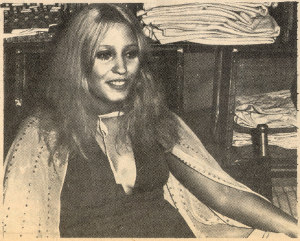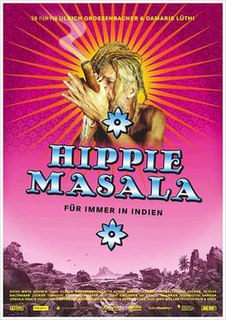
A hippie, also spelled hippy, especially in British English, is someone associated with the counterculture of the 1960s, originally a youth movement that began in the United States during the mid-1960s and spread to different countries around the world. The word hippie came from hipster and was used to describe beatniks who moved into New York City's Greenwich Village, San Francisco's Haight-Ashbury district, and Chicago's Old Town community. The term hippie was used in print by San Francisco writer Michael Fallon, helping popularize use of the term in the media, although the tag was seen elsewhere earlier.

A counterculture is a culture whose values and norms of behavior differ substantially from those of mainstream society, sometimes diametrically opposed to mainstream cultural mores. A countercultural movement expresses the ethos and aspirations of a specific population during a well-defined era. When oppositional forces reach critical mass, countercultures can trigger dramatic cultural changes. Prominent examples of countercultures in the Western world include the Levellers (1645–1650), Bohemianism (1850–1910), the more fragmentary counterculture of the Beat Generation (1944–1964), followed by the globalized counterculture of the 1960s (1964–1974).
Psychedelic trance, psytrance or psy is a subgenre of trance music characterized by arrangements of rhythms and layered melodies created by high tempo riffs. The genre offers variety in terms of mood, tempo, and style. Some examples include full on, darkpsy, forest, minimal (Zenonesque), hitech psy, progressive, suomi, psy-chill, psycore, psybient, psybreaks, or "adapted" tracks from other music genres. Goa trance preceded psytrance; when digital media became more commonly used psytrance evolved. Goa continues to develop alongside the other genres.
Goa trance is an electronic dance music style that originated in the early 1990s in the Indian state of Goa. Goa trance often has drone-like basslines, similar to the techno minimalism of 21st century psychedelic trance (psytrance). Psychedelic trance developed from Goa trance.

Hippie Hollow Park is a park located on the shore of Lake Travis in northwest Austin. It is the only legally recognized clothing-optional public park in the State of Texas. Though the land is owned by the Lower Colorado River Authority, it is leased to Travis County, whose Parks Department has administered the park since 1985. Sometimes erroneously labeled as a beach, the park actually sits on a somewhat steep slope above Lake Travis with limestone steps that can be quite rugged in some spots. Depending on the water level of the lake, access to the water may require some rock climbing.

Haight-Ashbury is a district of San Francisco, California, named for the intersection of Haight and Ashbury streets. It is also called The Haight and The Upper Haight. The neighborhood is known as one of the main centers of the counterculture of the 1960s.

Goa Gil is an American-born musician, DJ, remixer and party organizer. He is one of the founders of the goa trance and psytrance movement in electronic music.

Music of Goa refers to music from the state of Goa, on the west coast of India. A wide variety of music genres are used in Goa ranging from Western art music to Indian classical music. Konkani music is also popular across this tiny state. Being a former territory of Portugal, Goa has a dominant western musical scene with the use of instrument such as the violin, drums, guitar, trumpet and piano. It has also produced a number of prominent musicians and singers for the world of Indian music. Portuguese Fado also has significance in Goa.
This article is about the culture of natives of the Indian state of Goa.

Cleo Odzer was an American writer who authored books on prostitution in Thailand, the hippie culture of Goa, India, and cybersex.

The counterculture of the 1960s was an anti-establishment cultural phenomenon that developed throughout much of the Western world in the 1960s and has been ongoing to this very day. The aggregate movement gained momentum as the civil rights movement in the United States continued to grow, and with the intensification of the Vietnam War, it would later become revolutionary to some. As the 1960s progressed, widespread social tensions also developed concerning other issues, and tended to flow along generational lines regarding human sexuality, women's rights, traditional modes of authority, rights of non-white people, end of racial segregation and white supremacy, experimentation with psychoactive drugs, and differing interpretations of the American Dream. Many key movements related to these issues were born or advanced within the counterculture of the 1960s.

Housetruckers are individuals, families and groups who convert old trucks and school buses into portable homes called housetrucks and live in them, preferring an unattached and transient lifestyle to more conventional housing. These vehicles began appearing around New Zealand during the mid-1970s and, even though there are fewer today, they continue to travel New Zealand roads.
The hippie subculture began its development as a youth movement in the United States during the early 1960s and then developed around the world.
The "Me" generation is the self-involvement of Baby Boomers in the United States. The 1970s was dubbed the "Me decade" by writer Tom Wolfe; Christopher Lasch wrote about the rise of a culture of narcissism among younger Boomers. The phrase popularized at a time when "self-realization" and "self-fulfillment" were becoming cultural aspirations to which young people supposedly ascribed higher importance than social responsibility.

Hippie Masala: Für immer in Indien is a 2006 Swiss documentary film directed by filmmaker Ulrich Grossenbacher and anthropologist Damaris Lüthi.
Stuart Robert Henderson is a Canadian historian, culture critic, filmmaker, and musician. He is a writer and producer with 90th Parallel Productions, a documentary film company. He is the author of the Clio award-winning book Making the Scene, Yorkville and Hip Toronto in the 1960s. "Making the Scene" focuses on the history of 1960s Yorkville as a mecca for Toronto's and Canada's counterculture.
The Distant Drummer is a short-lived series of four 22-minute American documentary films produced in the early 1970s as a societal warning against the proliferation of drugs during the counterculture of the 1960s. Directed by William Templeton and written by Don Peterson, the series was produced by Airlie Foundation and George Washington University Department of Medical and Public Affairs and lists "in cooperation with" credits for the American Academy of General Practice, the District of Columbia Medical Society and the National Institute of Mental Health.
Hippie exploitation films are late 1960s-early-to-late 1970s exploitation films about the hippie counterculture with situations associated with the movement such as marijuana and LSD use, sex and wild psychedelic parties.











